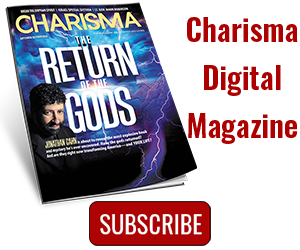
The Sunday before their departure, Parsons preached at Park Street Church in Boston, and his sermon proved prophetic. In part, he said, “Destroy, then, the Ottoman Empire, and nothing but a miracle would prevent [the Jewish people’s] immediate return from the four winds of heaven.”
Today, when a visitor stands at Jaffa Gate—crammed with taxis, souvenir vendors and a strange mixture of Orthodox Jews and Palestinians—the Old City is alive in ways Parsons and Fisk could scarcely imagine. That very destruction of the Ottoman Empire Parsons described is now behind us in history and, among other things, has opened the way wide for a glorious reality: the spiritual restoration of national Israel.
Scripture is filled with prophecies concerning this reality (see, for instance, Ezekiel 37), and it so happens we are seeing its fulfillment today, almost 200 years after Fisk and Parsons braved the Atlantic, fierce bandits and disease to see salvation brought to the Jews—and the present-day acceleration of this move of God has glory written all over it.
In his description of the missionary movement in the Mideast region during the 19th century, Michael Oren, in his book Power, Faith, and Fantasy: America in the Middle East, states that during one 40-year period, missionaries counted 30 total converts out of 20 million souls in the Ottoman Empire. Longtime supporters of the so-called “Messianic Movement” calculate there are perhaps 300,000 Jews worldwide who now believe in Jesus as the Messiah. Much fruit is being harvested among indigenous Arab populations too.
A Language to Call Their Own
The rise in Jewish converts has many Christian leaders excited today, and this wave of momentum is buoyed by a startling development: the world’s first Messianic Jewish translation of the New Testament, called Tree of Life: The New Covenant(TLV), published by the Messianic Jewish Family Bible Project and led by Daniah Greenberg, Jeffrey Seif and Daniel Kurzweil.
What’s more, Greenberg and her team are nearing the end of a multiyear project to craft a translation of the full Bible specifically for Messianic Jewish believers.
These Bible translations are a key turning point in prophetic history, and Greenberg and her team know it.
“This is really about the children and generations of Jewish kids who grew up and needed a Bible,” she says. “We put it on YouVersion and have seen 1.3 million chapter downloads just for the New Covenant since November.”
Seif, distinguished professor of Bible and Jewish studies at The King’s University and project manager for the translation, says of this Bible project that is openly called a miracle by those close to it, “Scores of Jewish people have come to faith in Jesus in the last 30 years. Emerging now, as a result of a number of those faith-filled Jews responding to the call to go to seminary, is a cadre of Messianic Jewish scholars minded to help others see Him more clearly—as a Jew. One of the fruits of this development is a brand-new, joint-venture translation of Scripture produced entirely by dozens of Messianic Jewish scholars and friends. ... Much as the New Testament itself is a collective of Jewish voices on Jesus, so too, after 2,000 years, Messianic Jews have now collectively offered sage insights on how to better read and understand the entire Bible.”
Greenberg and her team, in the end, will have spent five years and raised $750,000 to bring the entire Jewish Bible—known as the Tanakh—to completion.
A Tipping Point?
But it’s not just that more and more Jews are coming to believe in Jesus as the Messiah or that a new Bible translation is giving them access to the Scriptures in a language native to their Jewish sensibilities and understanding. It’s that many leaders in the Messianic movement now say the convergence of these things marks a significant moment in history.
Jack Hayford, the legendary evangelical leader whose heart is closely connected to the Messianic community and whom Greenberg says has called the release of the TLV “a sovereign moment,” well remembers the embryonic evangelistic efforts among Jews now decades past.
“I know for a fact 40 years ago, when I went to Israel the first time, conversions were rare,” he says. “Dr. Robert Lindsey told me back in 1970 that if they had one convert in a year [among Israeli Jews], it was considered a good year. Today it’s not unreasonable at all—as we keep Acts 2 in focus—that the Lord is adding daily to believers among the Jews.”
The conversion rate in Israel—and worldwide—is just one reason Hayford enthusiastically supports the work of the Bible translation team, saying it carries the dual importance of speaking to Jews in their own language but also carrying real value for Gentile families. Hayford has long recognized that rank-and-file evangelicals know little about the Jewish roots of their faith, and the TLV can help overcome that.
“The TLV is an explosive, prophetically fulfilling tool for speaking at this hour as an available resource for the Jewish community globally,” he says. “It was meticulously crafted to help a Jewish audience, but any Bible reader would benefit from it.”
Hayford, given his years working with the Messianic community, intuitively understands the significance of the Bible project and where we are in world history.
“There’s no question that there is an increase [in conversions] in many ways,” he says. “One reason is the global move of the Holy Spirit, and in that it’s impossible to assess it and not see it as very strong and likely evidence that we are seeing a reasonably rapid move toward the climax of all things. Just take Israel, alone, back in the land.”
Hayford also notices a hunger for the Word of God, which fuels belief: “I think the term I will discuss is not seeing them as conversions but as people who hold to the revelation of Jesus as the Messiah. Use of terminology has a lot to do with how Messianic Jews see themselves and limits their witness because other Jews who don’t know the Savior would see it as converting to Christianity and not understanding who the Messiah is. Jesus didn’t come to bring Christianity but to bring people to the Father.”
It is that reality that fuels the work of the Greenbergs, their staff, Hayford and others who have followed in the footsteps of those original pioneers in the land. One of those is Wayne Hilsden, pastor of King of Kings Community in Jerusalem, who has a front-row seat to watch—and participate—as this historic moment in history unfolds. King of Kings is the largest Messianic fellowship in Israel, and Hilsden, while not Messianic himself, has led it for 30 years.
“Frankly, up until we received our call in 1981 to serve in Israel, I had little or no interest in Hebrew roots,” he says. “That was 32 years ago, 18 months before we moved to Israel from Canada. Ever since that call, I’ve had a passion for digging into the Scriptures and the Hebraic milieu in which they were written.”
Hilsden, who completed a master of divinity degree at the University of Toronto, says New Testament Greek was a required course in his studies, but Old Testament Hebrew was only an elective. Having passed on Hebrew studies altogether, he says he’s had to play catch-up the last three decades now that the Hebraic background of the Scriptures and the modern Hebrew language comprise a majority of his work and day-to-day interactions.
In all this, Hilsden has come to realize the importance of the Jewish mindset on our collective understanding of the Old and New Testaments.
“In my seminary studies, there was an underlying assumption that New Testament writers such as Paul and John were more influenced by Greek culture and philosophy than their own Jewish heritage,” he says. “I’ve now come to see that Hebraic thinking was far more dominant in their expression of biblical faith than their exposure to a Hellenistic mindset.”
As such, one cannot help but consider the TLV translation an important contribution, again, to the Jewish and Gentile understanding of the Scriptures.
Truly, in Jerusalem, observers can see the fulfillment of what Hayford knows is the fulfillment of prophecy, culminating in the spiritual restoration of the chosen people. Hilsden is excited to see that up close.
“We see the early Jerusalem congregation as our primary model [at King of Kings], but we are far more multiethnic than they were,” he says. “The first congregation in Jerusalem was almost exclusively Jewish. It took the Jerusalem congregation many years to break out of its Jewish cocoon. Persecution and scattering were the catalysts to get these early Jewish believers to spread the gospel beyond Jerusalem and Judea.
“The church in Antioch is also a model we look to, in the way that it was multinational and apostolic—sending, missional—in nature.”
King of Kings has carved out a special place—and a safe place—for believers in Israel to congregate.
“We ... strive to follow the ideal of a ‘one new man’ congregation as envisioned by Paul in Ephesians 2:11-22. In King of Kings Community, we have Jewish, Arab and internationals in fellowship together. The Arab sector has been the smallest segment, but in recent years, more Arab believers are joining our ranks and feeling at home.”
The Fullness of Time Is Here
Before his young, sacrificial life was cut short, Levi Parsons wrote to his mission board, “As it respects gaining and imparting information, this is indeed the center of the world. The station must not be relinquished. The door is already open. Difficulties must be expected; but the good resulting from a mission established here will be an infinite reward.”
The station has not been relinquished. Rather, it has expanded. That reality excites believers and missionaries working in various fields, and the expectations are palpable. The growing numbers of believers among Jews and Arabs—along with the glorious “unveiling” of the TLV—signal we are living in momentous times.
It is a time Levi Parsons and Pliny Fisk longed to see.
Jim Fletcher is director of Prophecy Matters (prophecymatters.com) and can be reached at [email protected]. He writes for online sites, including RaptureReady, the Jerusalem Post and Beliefnet.
Watch Ray Gannon and Jonathan Bernis from Jewish Voice discuss why the Tree of Life Bible is so important at messianicbible.charismamag.com
To contact us or to submit an article, click here.
Get Charisma's best content delivered right to your inbox! Never miss a big news story again. Click here to subscribe to the Charisma News newsletter.






